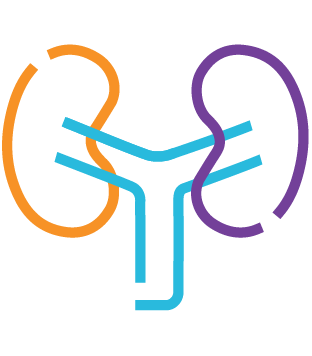
Most individuals (greater than 80%) with tuberous sclerosis complex (TSC) will develop some form of renal (kidney) disease during their lifetime. There are three renal disorders in TSC: renal cysts, renal angiomyolipoma and renal cell carcinoma.
Renal angiomyolipomata, or angiomyolipomas, are usually the greatest concern in TSC. The blood vessels within angiomyolipomas are abnormal and can develop weak spots in their wall, called aneurysms, that can burst and lead to bleeding. About 20% of the time this bleeding is life-threatening. Renal angiomyolipomata occurs in approximately more than 80% of TSC patients. Most of the time both kidneys are involved.
Renal cysts are often small, benign fluid filled “holes” in the kidney that occur in about 50 percent of individuals with TSC. These cysts, even if they are not very common, can lead to increased blood pressure, but usually they do not cause discomfort. However, sometimes the kidney is filled with cysts, and this can lead to kidney impairment and even kidney failure, requiring dialysis or transplantation.
Lastly, renal cell carcinoma, the least common renal association with TSC, is a cancerous growth of the kidney. Although it is very rare, such a lesion must be kept in mind.
There are multiple ways that the kidney can be affected in TSC. Angiomyolipoma is clearly the most common and likely to cause symptoms. With careful evaluation, monitoring and appropriate intervention, which should be performed by a team with TSC experience, many individuals with TSC can maintain normal kidney function.







